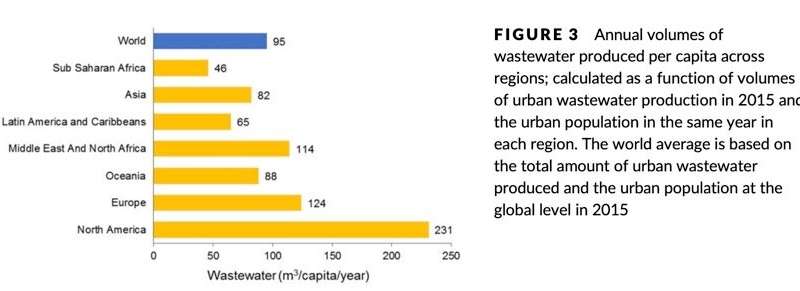Vast amounts of valuable energy, nutrients, water lost in world's fast-rising wastewater streams
Published on by Water Network Research, Official research team of The Water Network in Academic
Annual volumes of wastewater produced per capita across regions; calculated as a function of volumes of urban wastewater production in 2015 and the urban population in the same year in each region. The world average is based on the total amount of urban wastewater produced and the urban population at the global level in 2015 Credit: UNU-INWEH
Vast amounts of valuable energy, agricultural nutrients, and water could potentially be recovered from the world's fast-rising volume of municipal wastewater, according to a new study by UN University's Canadian-based Institute for Water, Environment and Health (UNU-INWEH).
Today, some 380 billion cubic meters (m3 = 1000 litres) of wastewater are produced annually worldwide—5 times the amount of water passing over Niagara Falls annually—enough to fill Africa's Lake Victoria in roughly seven years, Lake Ontario in four, and Lake Geneva in less than three months.
Furthermore, the paper says, wastewater volumes are increasing quickly, with a projected rise of roughly 24% by 2030, 51% by 2050.
Today, the volume of wastewater roughly equals the annual discharge from the Ganges River in India. By the mid-2030s, it will roughly equal the annual volume flowing through the St. Lawrence River, which drains North America's five Great Lakes.
Among major nutrients, 16.6 million metric tonnes of nitrogen are embedded in wastewater produced worldwide annually, together with 3 million metric tonnes of phosphorus and 6.3 million metric tonnes of potassium. Theoretically, full recovery of these nutrients from wastewater could offset 13.4% of global agricultural demand for them.
Beyond the economic gains of recovering these nutrients are critical environmental benefits such as minimizing eutrophication—the phenomenon of excess nutrients in a body of water causing dense plant growth and aquatic animal deaths due to lack of oxygen.
The energy embedded in wastewater, meanwhile, could provide electricity to 158 million households—roughly the number of households in the USA and Mexico combined.
The study's estimates and projections are based on theoretical amounts of water, nutrients, and energy that exist in the reported municipal wastewater produced worldwide annually.
Among many findings:
- The energy value in 380 billion m3 of wastewater is estimated to be 53.2 billion m3 methane—enough to provide electricity for up to 158 million households, or 474 million to 632 million people, assuming an average of three to four persons per household. Given the foreseen wastewater increases, that number rises to 196 million households in 2030, and 239 million households in 2050.
- In agriculture, the volume of water potentially recoverable from wastewater could irrigate up to 31 million hectares—equal to almost 20% of the farmland in the European Union (assuming two crops and a maximum 12,000 m3 of water per hectare per year). "The reclaimed water can be used to irrigate new areas or replace valuable freshwater where crops are already irrigated."
- World wastewater production is expected to reach 470 billion m3 by 2030, the year by which the SDGs are supposed to be met—a 24% increase from today. And by 2050, it will reach 574 billion m3, a 51% increase.
- Asia is the largest wastewater producer with an estimated 159 billion cubic meters, representing 42% of urban wastewater generated globally, with expectations of that proportion rising to 44% by 2030
- Other regions producing large volumes of wastewater: North America (67 billion m3) and Europe (68 billion cubic meters) - virtually equal volumes despite Europe's higher urban population (547 million vs. North America's 295 million. The difference is explained by per capita generation of wastewater: Europe 124 cubic meters; North America 231 cubic meters). By contrast, Sub-Saharan Africa produces 46 cubic meters of wastewater per capita—about half of the global average (95 cubic meters), reflecting limited water supply and poorly-managed wastewater collection systems in most urban settings.
- Full recovery from wastewater could, theoretically, offset 14.4% of global demand for nitrogen as a fertilizer nutrient; phosphorus 6.8% and potassium 18.6%. Based on current levels of nitrogen, phosphorus, and potash use in agriculture worldwide (estimated at 193 million metric tonnes in 2017), the study says about 13.4% of the global fertilizer nutrient demand could be supplemented by full nutrient recovery from wastewater.
- The nutrients in wastewater could theoretically generate revenue of $13.6 billion globally: $9.0 billion from the recovery of nitrogen, $2.3 billion from phosphorus, and $2.3 billion from potassium.
SOURCE PHY.ORG by UN University Institute for Water, Environment and Health
This is a paid article available on Wiley https://onlinelibrary.wiley.com/doi/abs/10.1111/1477-8947.12187
Media
Taxonomy
- Nutrients Recovery
- Nutrient Recovery & Reuse
- Wastewater Heat Recovery
